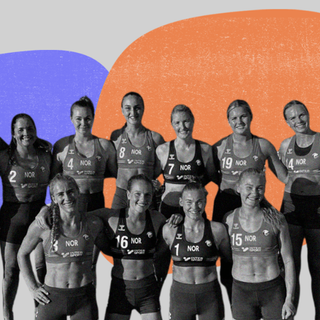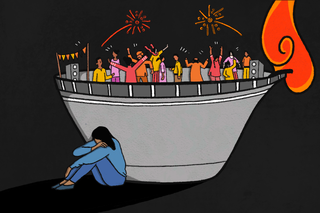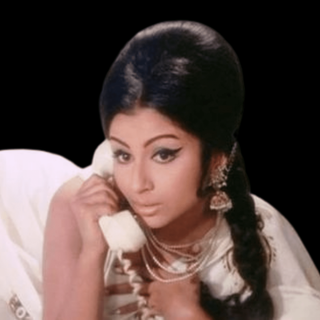
Why the Festival Season Can Feel So Isolating
“When there is an expectation of performing happiness and feeling joyous or celebratory… I do very badly.”

“It was a kind of magic, actually, how much happiness we could get out of one day a decade ago, and not now.”
Ram*, 25, feels a sort of disenchantment with the idea of festivals that is not new to many. It stems from having “grown up” too soon and not spending the festive holidays in the same way or with the same people as he used to.
There is the omnipresent holiday ad jingles, the lights, colors, sounds, and flurry of festive activity; but not everyone who participates in the cheer feels all that great.
There are no Indian statistics for this, but those from across the pond resonate. A survey by the American Psychological Association found that 38% of the people surveyed experienced stress during the holidays due to lack of time, family gatherings, the financial pressure of gift-giving, and others. Another survey also found that 64% of people living with mental illnesses felt worse during this time.
In India, it is almost taboo to be anything but positively bursting with joy and exuding festival spirit. Many face shame, guilt, and isolation for deviating from the script even a little bit.
“Performing” festivities can be a terrible burden on many and can feel forced. “I am not very fond of festivals. The expectation to dress up, be cheerful, help out at home with chores, do decor, meet and greet people you don’t even like sort of makes me anxious,” says Prakriti, 26. Her friends, family, and even “random people” like neighbors sometimes mock and shame her for not being as “happy,” for being a “party pooper.”
Muskan struggles with this pressure too. “You see people looking their best, meeting so many loved ones, having the best times and people who don’t share the same experience… feel like more of an outsider.”
The feelings of isolation come with the forced celebratory nature of festivals, following a script set in stone from which there is little room to deviate. If one is not seen to be participating in a celebration in the socially sanctioned ways, it is likely that family and friends will see them as an outlier and burden them with the pressure to conform.
“When everything around you seems healthy and fixed, it strikes a broken chord inside you. It’s a little overwhelming and exhausting to constantly be in sync with everything else,” she adds.
Social anxiety, guilt, and even grief during the festival season can result in a lot of negative self-talk and self-blame if our emotions and ideas of celebration don’t reflect the external environment, according to Devika Kapoor, a therapist practicing at In Strength Counselling.
Related on The Swaddle:
Holidays and the Great Big Indian Family
“I have a hard time in general regulating my emotions, especially when there is an expectation of performing happiness and feeling joyous or celebratory… I do very badly,” says Naomi, 23.
On such occasions, it’s looked down upon if someone sits quietly alone in a corner, notwithstanding that this is how many cope with the situation. “Your coping itself can draw attention and make people [with social anxiety] feel on the spot, which is another trigger for people with social anxiety,” Kapoor says.
For Pooja, 23, rituals get overwhelming because of the gendered expectations around doing festival work, with the men in the house refusing to help. “I get anxious every time someone says ‘Next week is a holiday, it’s this festival.’ In my head, that means they’re going to force me to prepare for it,” she says.
People also simply may not resonate with a certain festival or religion’s values. In this context, religious festivals especially come with a lot of baggage for young people.
“I had this attachment towards Diwali since childhood but, as I grew, I realized that Hinduism is full of oppression and discrimination… I feel guilty for carrying a certain amount of happiness associated with the whole festive vibe,” says Shweta. Her family also shames her for not dressing up and celebrating, accusing her of not being a “good Hindu.”
“Religious holidays are hard for people with religious trauma, so that’s there as well… I just want to be left alone to read a book on Christmas Eve and eat at a restaurant instead of attending choir practices all month (which I do out of compulsion) and see my already tired family work so hard to prepare decorations and food, which we can’t even savor,” says Antara*, 23.
Farah Maneckshaw, a therapist, explains the internal conflict that arises out of such situations. “For a lot of people, a lot of these festivals used to bring a lot of joy, stability and happiness in their childhood. Now, when they look at it more critically, it creates an internal cognitive dissonance of something that used to be fun and heartwarming and how problematic their histories are,” she says.
This year also represents the second year into the Covid19 pandemic and is marked by an incalculable sense of loss. Many families are still in mourning, Kapoor notes, and many simply feel devastated at how their families have been marked irreversibly by loss.
Among the others, this is a feeling that resonates with me. After having lost loved ones to the pandemic, a sense of resentment crept into me, unbidden, at everyone else’s joy and happiness. The air of unabashed joy can be liberating for some; for others, it can be suffocating.
Maneckshaw speaks to the damaging effects of such toxic positivity, especially in the pandemic.
“We’re being expected to move along as though something catastrophic has not happened, as though our daily lives and routines and structures and support systems haven’t been significantly altered, as though we’re not grieving what our lives used to be,” she says.
Histories of collective trauma tell us how many people who are most affected tend to forget joy. The pandemic is no exception, and the lack of acknowledgement, solidarity, or sense of community can be further isolating.
“Making space for that sadness, that loss, grief or difficulties even though it’s holiday season or festivities is important,” she adds.
This is not to say that everyone has to be morose during festivals or anything less than what they really feel. “Who am I to deny them that? In return, I only wish that my fellow Bengalis would not deny me the right to ignore their beloved festival,” writes Oindrila Mukherjee for The Scroll about the cultural isolation she feels for not liking Durga Puja as a Bengali. With all the anxiety and the blues around festivals, perhaps it is this truce — finding a respectful middle ground and allowing one another space — that we really need to infuse into the “festive spirit.”
*Names have been withheld on request
Rohitha Naraharisetty is a Senior Associate Editor at The Swaddle. She writes about the intersection of gender, caste, social movements, and pop culture. She can be found on Instagram at @rohitha_97 or on Twitter at @romimacaronii.
Related


How Making Fun of Cultural Stereotypes Keeps People From Bonding With Their Communities
